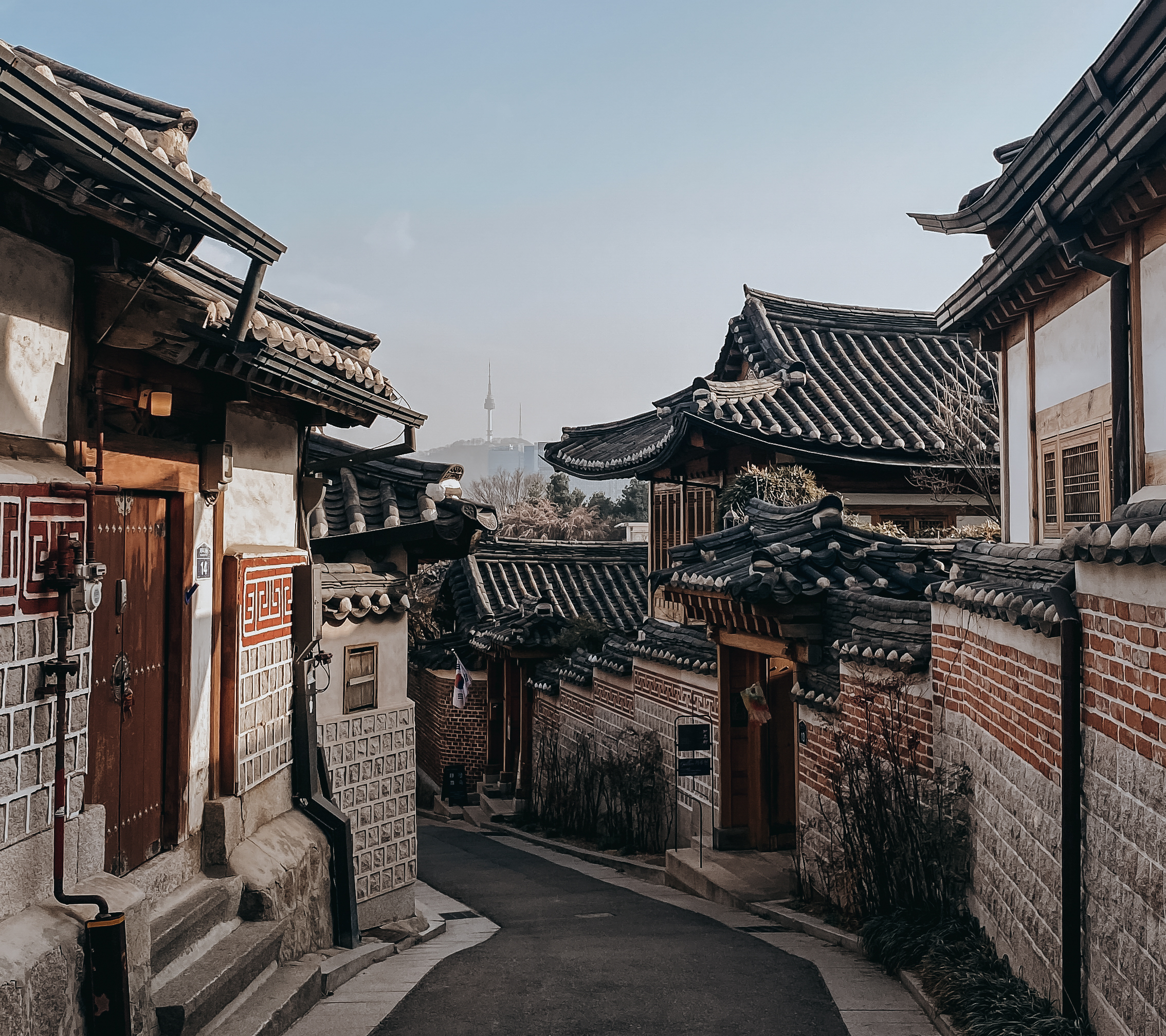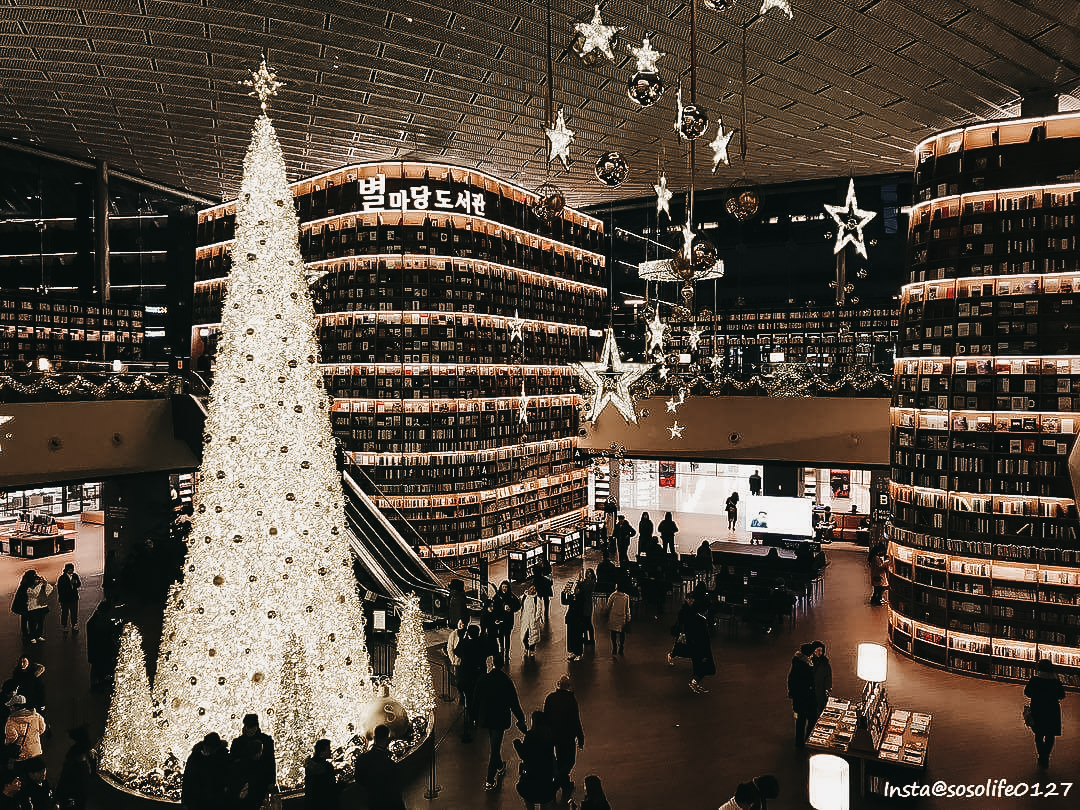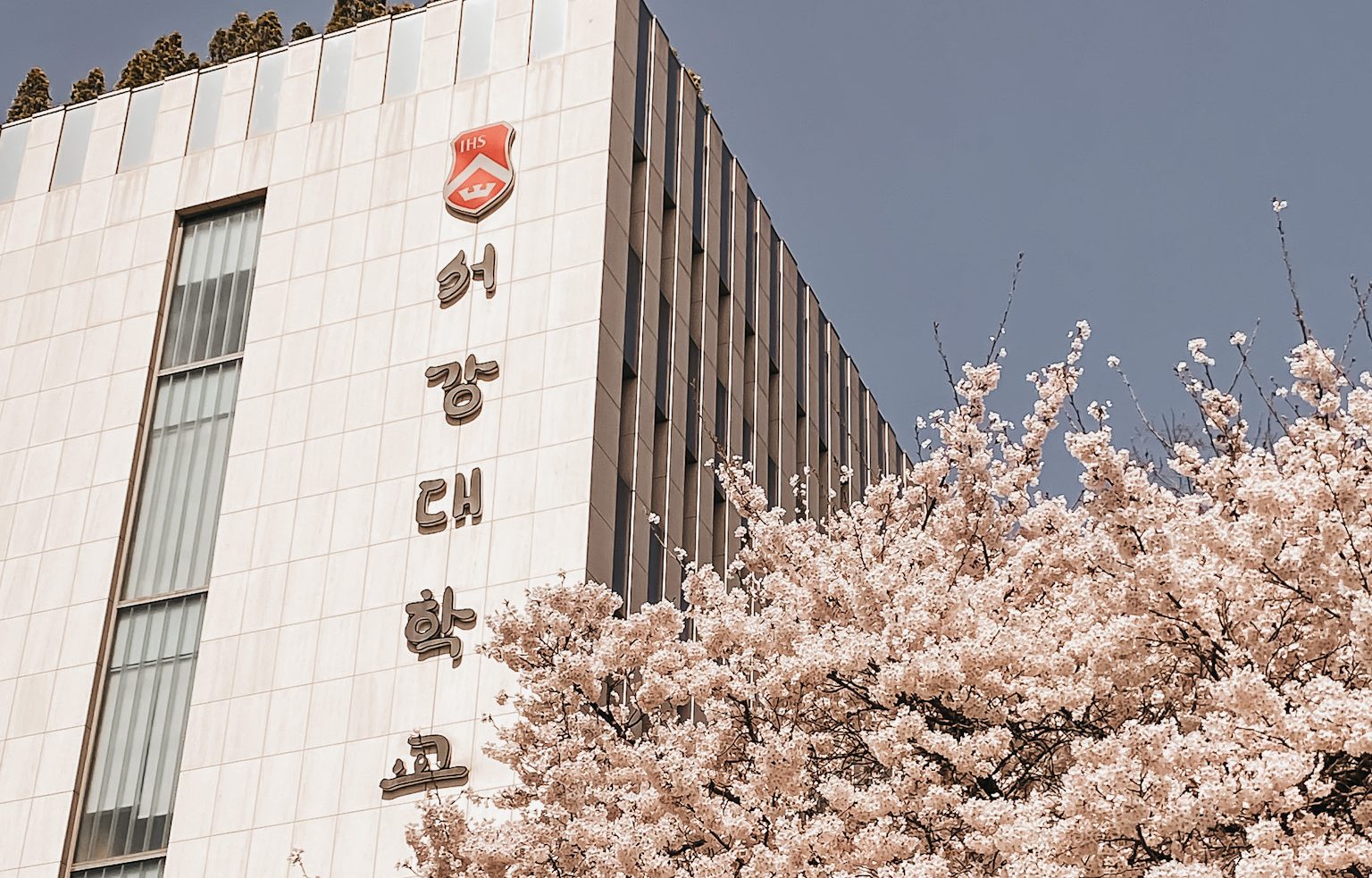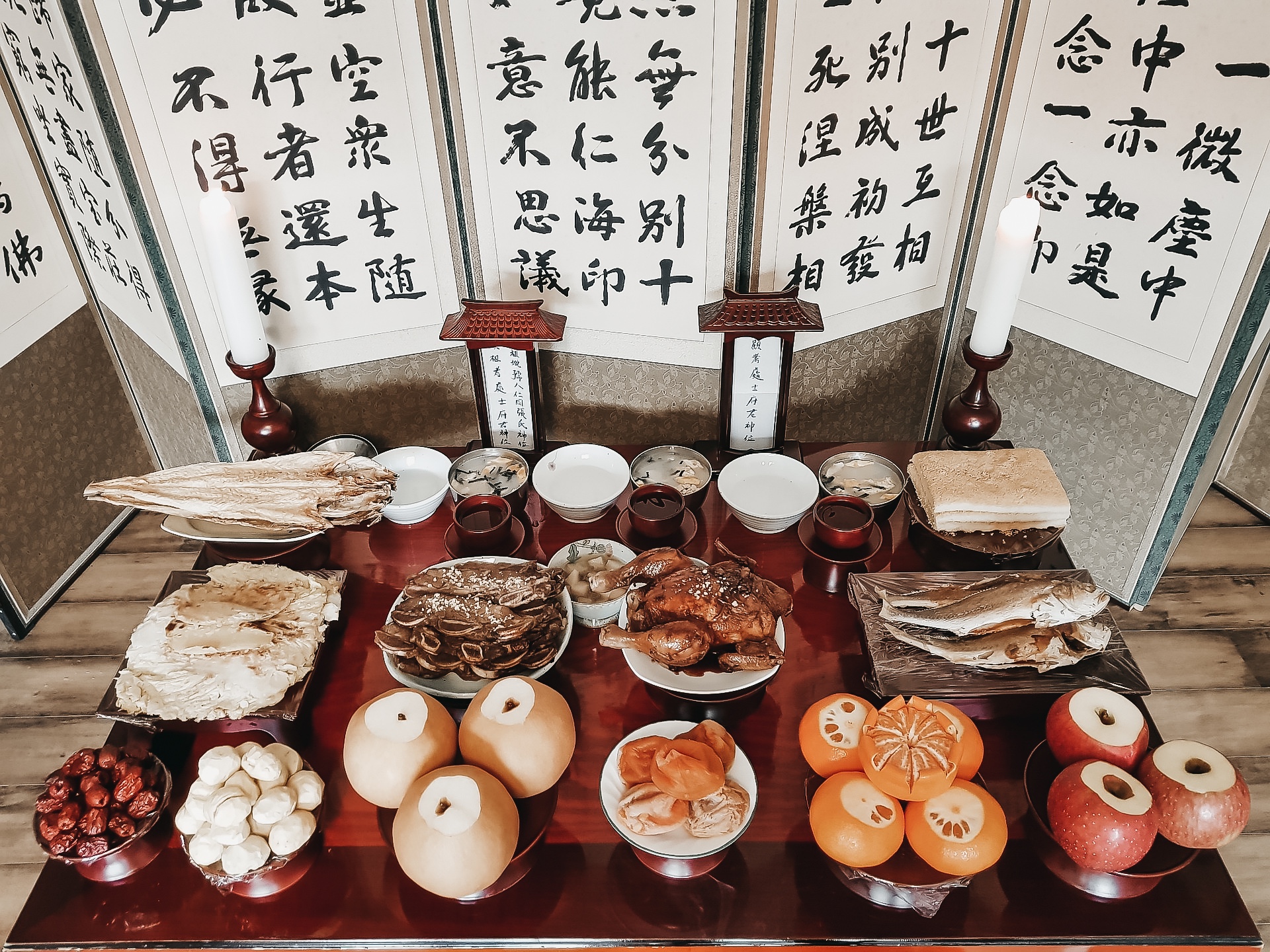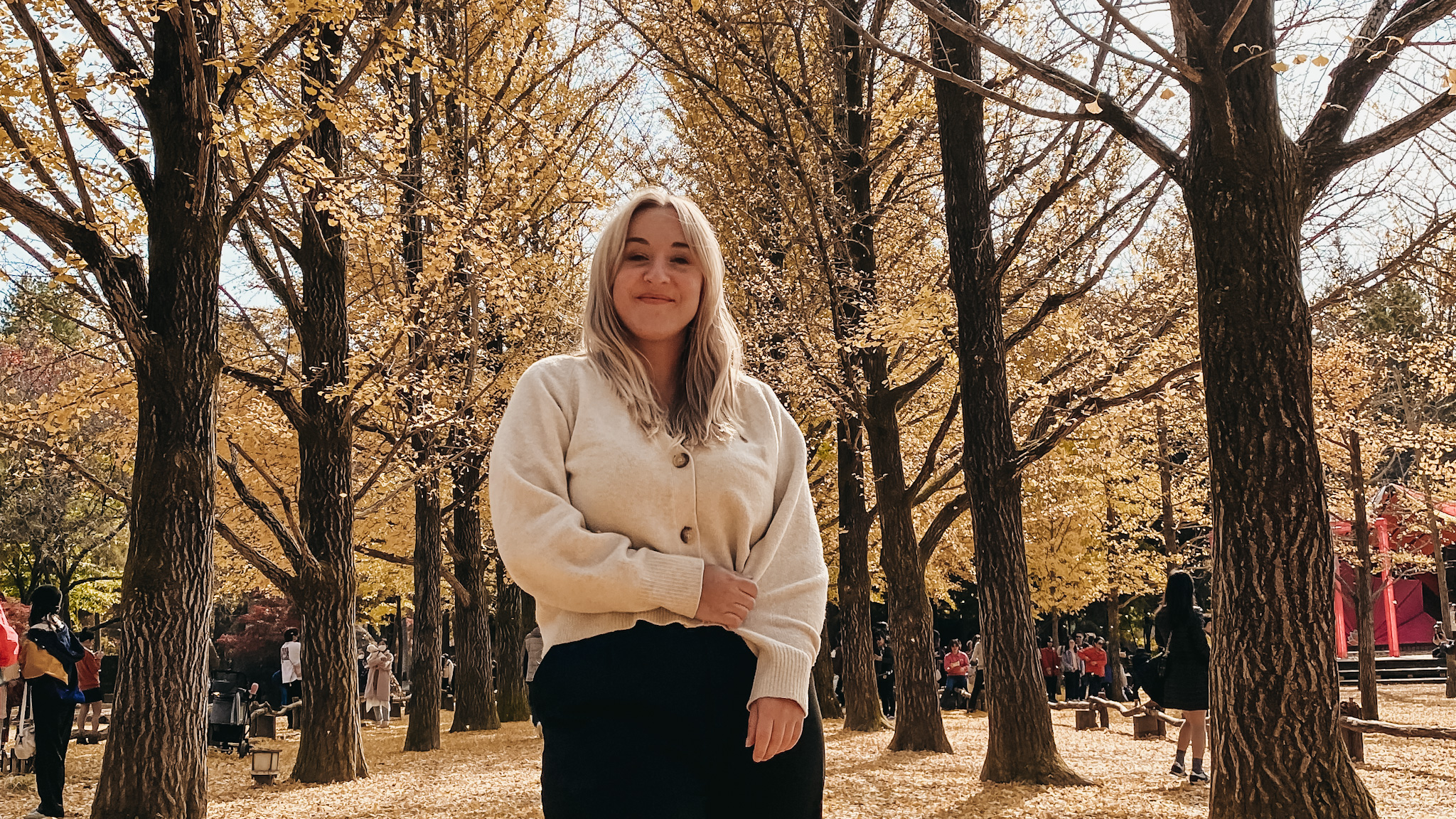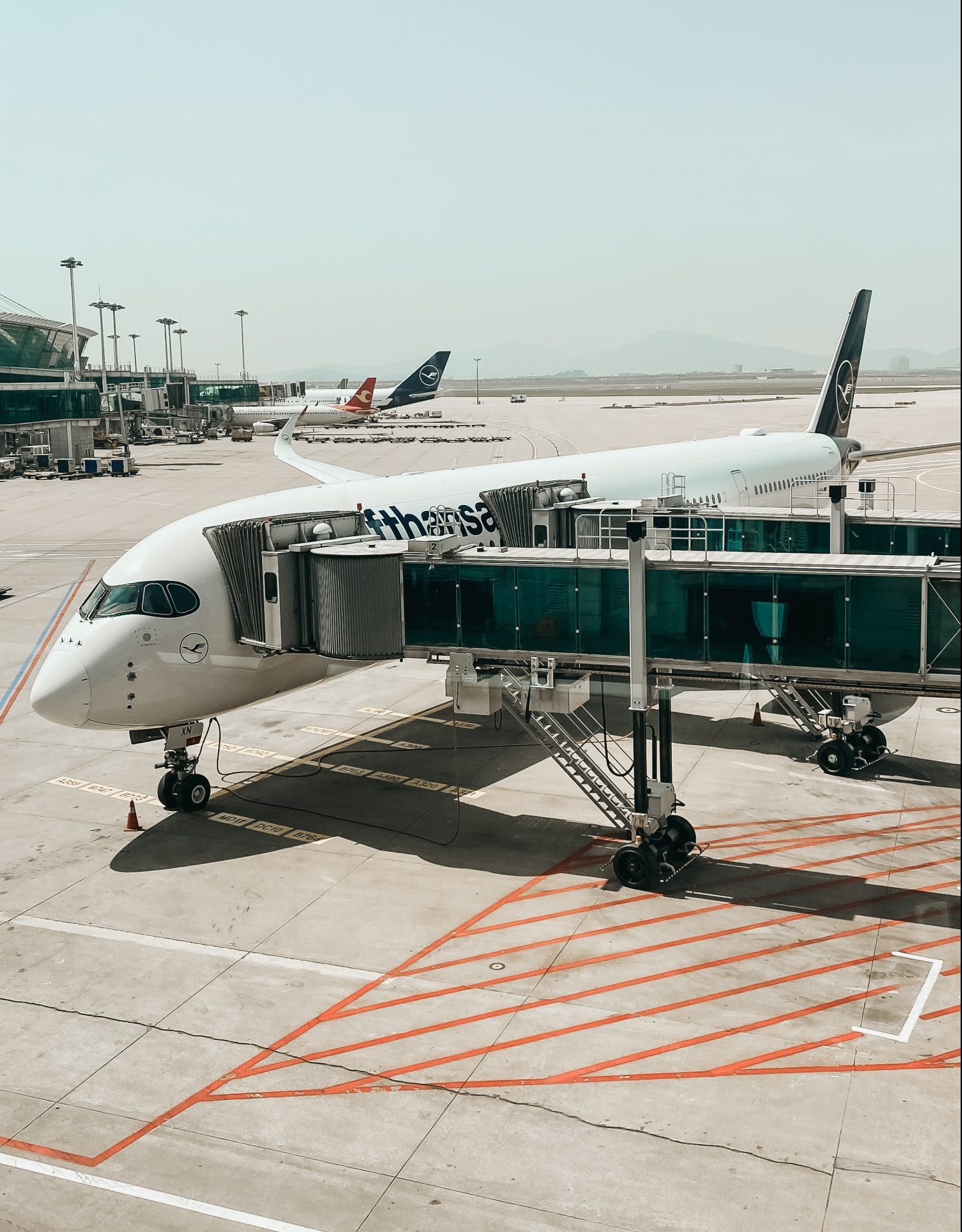If you’re interested in learning Korean in South Korea, then this video is perfect for you. In this blog post, I’ll give you a brief overview of the D4 visa, which is specifically designed for people who want to study the language at a Korean university.
In this post:
ToggleIMPORTANT DISCLAIMER: Please note that the information is based on my experience as a German citizen who came to Korea in November 2021, so it may not be 100% accurate for everyone. Make sure to do your own research and consult the websites of the universities you’re interested in, as well as the embassies, to get the most up-to-date and relevant information for your personal circumstances.

KOREAN LANGUAGE PROGRAMS
South Korea has numerous language programs and institutions that offer very different kinds of lessons. Some popular options include language programs of Korean universities, language institutes (Hagwons), and government-sponsored programs like the Korean Language Program (KLP).
Companies like ESL or EF offer Korean language Program Packages and will organize everything for you. There are also many private Language Academies like Lexis or Easy Korean Academy that offer Language Courses in Korea. If you’re staying in Korea longterm the KLP organized by the government is a great option, that also offers preparation courses for the Longterm Residency Tests.
In this Blog Post I will focus on the Language Programs of Korean Public Universities, which is what I did the first 15 months of my stay in Korea and which is the reason, I am now able to communicate in Korean easily in every day life.
UNIVERSITY LANGUAGE PROGRAMS
Most Korean universities offer similar Korean language programs. They originally started those programs for international exchange students that want to attend Courses in Korean. For some Bachelor or Master Degrees attending 6 to 12 months of such a language course is mandatory at many Korean Universities.
Academic Vs. General Course
As Korea became more and more popular with time, not just as a travel destination but also for people willing to live here long term, they opened those language courses to people who do not plan to take a degree afterwards. That’s why you can often see an “academical” language course for people planning to afterwards study as a normal university student or “general” language programs for people that want to just study the language to find a job or just for fun – like me.
Program Levels
The language courses themselves are not a degree like a bachelor or master. Still you will get grades after each semester and an official graduation certificate usually after level 6 or 7. Most university’s language programs offer different levels from beginner (Level 1) to advanced (Level 6/7). Each level takes one semester, which is usually around three months, depending on the university’s schedule.
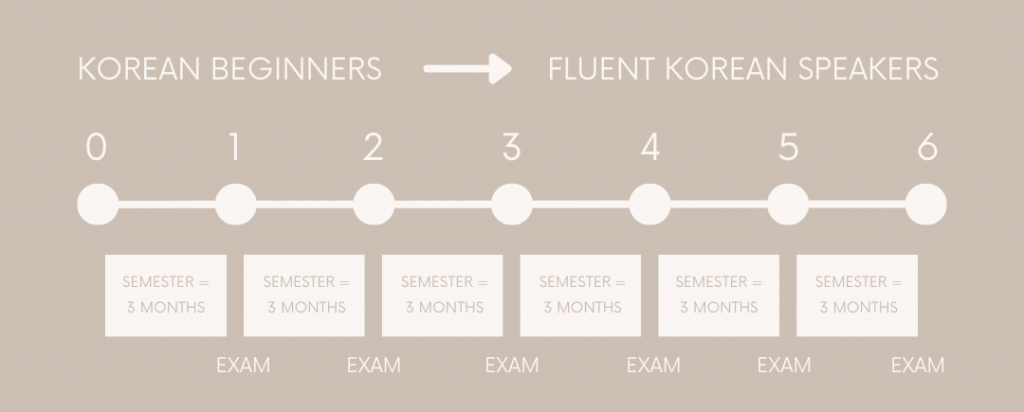
So for example, if you start with zero knowledge or you can barely read the Korean alphabet and just know some words, you would start at Level 1. If you want to reach Level 4, you would typically need to plan four semesters, which is a total of 12 months, as long as you pass all the level exams each semester. If you already have a good grasp of the Korean language, you will need to take a written and oral test before the semester begins to determine your starting level.
Course Hours
The language program usually consists of four to five hours of Korean language classes from Monday to Friday. Most University’s General Programs are from 9 AM to 1 PM. Some universities offer afternoon courses too.
Costs
Depending on which university you choose, the tuition per semester usually is between 1,100 to 1,500 USD. On top of that you have to calculate the costs for flights, accommodation, visa & application fees, food and so on. For the Application you will need 10,000 USD savings on your bank account to show that you have sufficient funds to stay.
Scholarships
Most scholarships are for full time students planning to take a degree at the university after the language course or that are studying Korea related majors as a full-time student and take the language course for bonus credits etc.
Unfortunately there are almost no scholarships offered for general courses. The only scholarships I found are for people that already took multiple levels, have extraordinary Korean Skills and 100% attendance and an official recommendation from the teachers.
Documents and Application
I will talk about required documents and the application process later in this article.
VISA INFOS & BASIC REQUIREMENTS
The D-4-2 visa is specifically for Korean language learners studying at least 6 months at a Korean university in one of the previously explained courses. It is not applicable to private academies or institutions, so make sure to choose a public university in South Korea.
Highschool Diploma
You should be either shortly before or already having completed your high school education and therefore have a diploma that you can send them.
Admission Letter from Uni
Of course you need proof that you are enrolled in one of the University’s Language Programs – therefore the University will give you an admission letter.
10,000 USD Savings
This money is necessary to show you’re able to live here for the first few months without work. It can be your money or money from a guarantor like your parents.
No Age Limit or Country Restrictions
Different than most other Visa Types in Korea, the D4-Visa has NO AGE LIMIT and almost all countries of the world can apply for it. Still: Please always check the official websites for reliable information.
Work Permit
You are officially not allowed to take Part time Jobs within the first 6 months. After those 6 months you can work 10 hours per week without TOPIK Certificate and 20 hours per week with TOPIK Certificate. But you need to register part time jobs at the immigration office and for this need the confirmation of your university that your grades and attendance are good enough to do so. That’s the main reason, why the 10,000 USD are required – to make sure you have enough money to stay here without working the first 6 months.
APPLICATION PROCESS
Now that you know what to expect from a language course and if you might be eligible for it, let’s have a look at the application process. There are Agencies like >GoGoHanguk that will help you with you application for free, but you still have to prepare the documents yourself and they only offer a few universities. So I will still explain the process here:
Research Requirements
Before you can start preparing your application documents, you need to decide which university you want to attend and what documents you need to prepare for your specific situation and home country.
Here the most important websites to check during your research:
- University Websites
- Korea Visa Portal (>here)
- Study in Korea (>here)
- Korean Embassy (Choose your home country >here)
- Korean Visa Application Center (>here)
Choose a University
One important part of the Researching Process is choosing a university and language Program. There are several factors to consider when exploring your options. Here are some things I looked into when choosing my university:
- Course offerings
- Curriculum (Course Content)
- Semester Schedule
- Costs
- Location
- Rankings
- Reviews
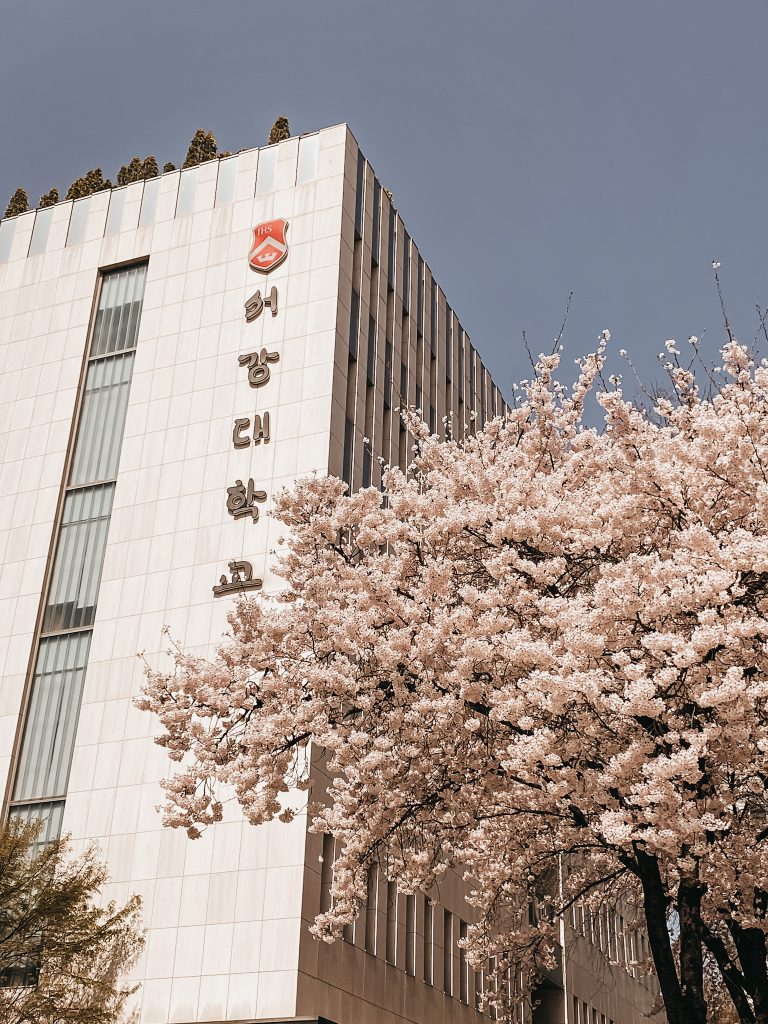
Personally, I chose to study at Sogang University because they focus heavily on speaking the language (which is quite rare in Korea) while other Universities focus on Memorizing, Reading and Writing for good grades. This will still be an important point at Sogang too, but in comparison to my friends who attended other language programs, I have the least anxiety speak in daily life thanks to the structure of the Sogang Course.
Another plus of Sogang University was the location (close to Hongdae) and the overall positive reviews. However, of course the choice of university is ultimately up to you and your preferences.
If you plan to study a degree after the Language course, I recommend you to take the language course at the university that offers your course and check on the requirements for full-time students first.
Prepare the Documents
Once you have decided on a university, you can start preparing your application documents. Each university has its own requirements, so check their websites for the specific documents you need to prepare. For my application to Sogang University and the D4 Visa, I had to prepare the following things.
University Application Form
Including your personal information, why you want to study Korean and your previous language level / experience.
High School Diploma
Officially translated and apostilled copy of your high school diploma or higher certificates. See info box below!
Bank Statement
Proof of sufficient savings (10,000 USD) in your bank account or guarantor confirmation. My university needed this document translated into English, too.
Passport
Make sure your passport is at least valid for the next 6 months and get good colored copies of it.
Visa Application Form
Get the newest Visa Application form and fill in your information as much as possible.
ID Photo
A 3.5 x 4.5 cm official ID photo taken within the last 6 months for the Visa Application.
Proof of Payment
Some Universities will ask you to send proof of payment, once they accepted your application.
Certificate of Admission
Once you got accepted by the university, they will send you an admission letter which you will need for the Visa Application.
University Business Registration
For the Visa Application, the University will send you a business registration so the Embassy / Immigration Offices knows it’s a public university registered in Korea.
Country specific Documents
As mentioned earlier there are documents specifically necessary for some countries for example a letter of guarantee or some health checks. Please check the above mentioned websites for your research.
IMPORTANT: Make sure to NOT get your original Diploma apostilled but a COPY or the Translation of it. Apparently the Universities have to keep the original version of the apostille in their archive, so only give them a copy!
I also recommend to bring another apostilled copy of your latest certificate in case you want to switch Visa after the Language Course for example for a working visa.
Apply for the University
So now that you have an idea what documents you will need and prepared most of it, you can apply for the Korean language Course at your chosen University. First check the Application Deadlines of your favorite University and make sure to apply within this time frame.
Most bigger Universities will require you to make an account on their website to apply. I did this and applied right at the beginning of the application period to have enough time to apply for the Visa.
Within this online application process I needed to upload the documents on the Website and then send the original of the Apostilled Diploma to the University via post.
Pay tuition & Wait for confirmation
Once they got the original Apostille and checked the application, you will get an Email or notification with the Payment Details to pay the Tuition and Application Fees.
Make sure to pay the Tuition as fast as possible as the bank transfer will take some time and as long as it’s not paid, you won’t receive the documents necessary for the Visa Application.
Apply for the Visa
The visa application process varies in each country, so I unfortunately can’t go into detail here. Check the website of the Korean embassy in your home country and the Korean visa application center for information on the process, deadlines, and required documents.
Generally, the documents required for the visa application are similar to those needed for the university application. So make sure to collect all documents, send them in or apply in person – again that depends on the process of the Korean Embassy in your home country.
I was able to send them, but as I lived close to the city with Germany’s Visa Application Center and you have to send very important documents like your original passport, I decided to bring it in person. That way I was also able to ask some more questions and the nice staff went through the documents with me to have a first glance if its complete.
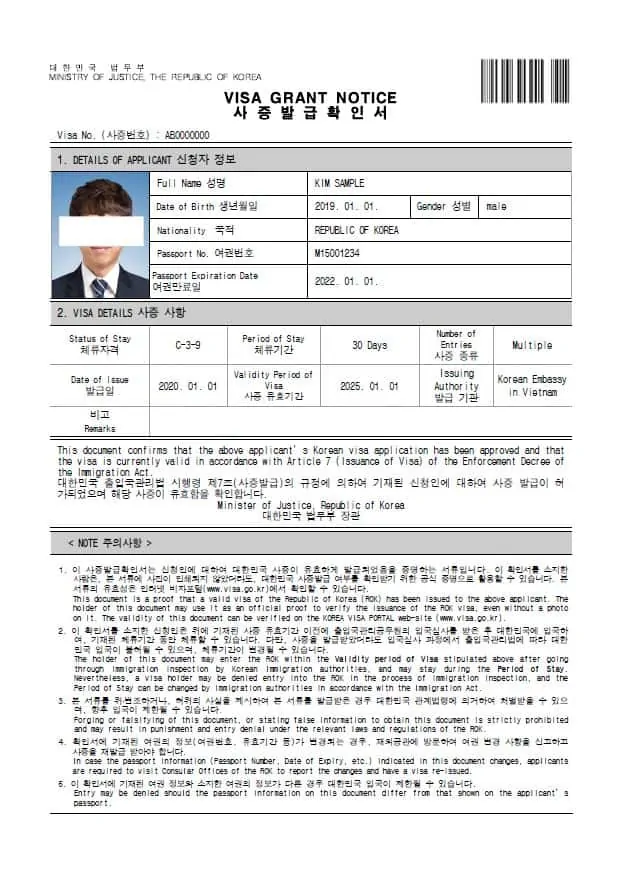
Once you receive your visa grant notice you are basically able to go and enter Korea with this Visa!
After your Visa Application you have to wait and check the Website of the Korean Embassy or Visa Application Center in your home country. Usually they will NOT actively send you a notification about the Visa Confirmation but you have to regularly check it by yourself.
NEXTSTOPKOREA TIP: I highly recommend making an appointment with the immigration office as soon as you know when you’ll be in Korea and know your housing Details. The Alien Registration Card (ARC) is essential for various activities in Korea, such as food delivery, online shopping, online banking, and even getting a Korean phone number or opening a bank account. Therefore, it’s crucial to apply for the ARC as soon as possible, even before arriving in Seoul if you can.
I really hope this Guide helped you to get an overview on how to Apply for the D4 Visa to study Korean in South Korea. In my Opinion it is a great option to spend some time in Korea and if you’re planning to stay here long term it is the best way to get what’s necessary to find a job in Korea. Make sure to subscribe to my Newsletter to get a notification when I will share more details about the Job hunt in Korea!
